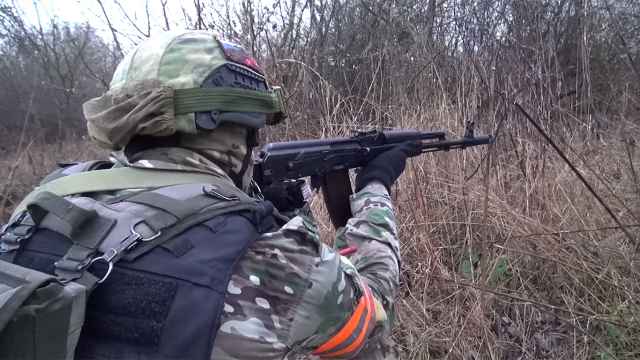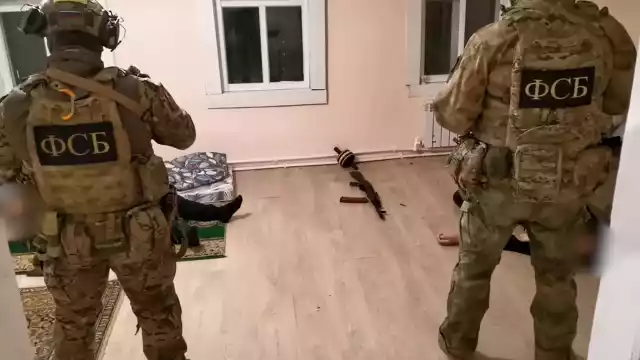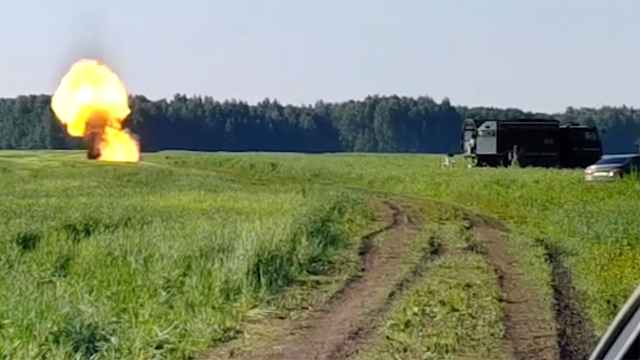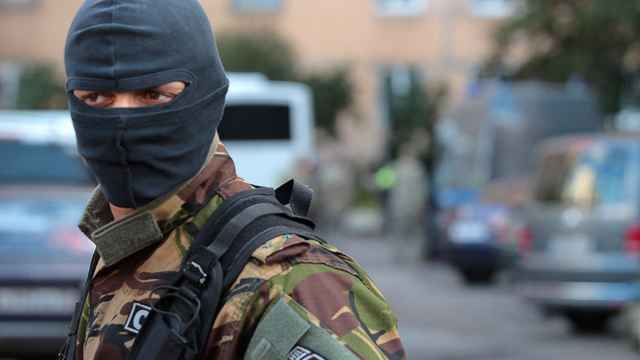Russian state-run media on Saturday released videos of law enforcement agents interrogating three men suspected of carrying out the deadly attack on a Moscow region concert hall the night before.
Russia’s Federal Security Service (FSB) earlier on Saturday announced the arrest of 11 people, including four suspected assailants, in connection to the attack on Friday.
In one of the interrogation videos, shared by the RIA Novosti news agency, a man could be seen lying face-down on the ground as another man, whose identity was not revealed, held him by his hair so that he faced the camera.
The man holding the detainee’s head asked: “What did you do in Turkey?”
“There [in Turkey] my documents expired, I crossed the border here,” the detainee said, possibly referring to his passport.
He then identified himself as Shamsutdin Fariddun, adding that he was born on Sept. 17, 1998.
Russia’s Interior Ministry said Saturday that the four suspected gunmen arrested over Friday night’s deadly attack were foreign nationals, with some media outlets reporting that among them were citizens of the Central Asian republic of Tajikistan.
“What did you do in Crocus [City Hall]?” the man holding Fariddun’s head asked in the video, referring to the location of the mass shooting.
“We shot... people... for money,” Fariddun replied.
He then explained that he was promised 1 million rubles ($10,800) to carry out the attack, half of which he claimed to have already received by card transfer.
Fariddun, visibly shaking, added that he did not know the identity of the individuals who paid him to carry out the attack, but said that they had contacted him on the messaging app Telegram.
Russia’s FSB has been accused in the past of staging interrogation videos.
In a separate video published by RIA Novosti, a second man, speaking in Tajik, was seen being interrogated through an interpreter, who spoke off-camera.
According to him, he was living in a hostel with the other suspected assailants behind Friday’s attack.
The man claimed that he was in communication with individuals by the names of Abdullo and Muhammad, but it was not clear to whom exactly he was referring.
In a third video, another man detained by law enforcement agents identified himself as Rajab Alizadeh.
A man off camera asked him: “When you fled from Moscow, you had weapons. Where did you throw them? There or here?”
Alizadeh, whose face and shirt were covered in blood and whose head was wrapped in medical gauze, said “somewhere along the road,” but could not recall exactly where he and his accomplices left their weapons.
An unverified graphic video shared online showed what was said to be Alizadeh lying face down on the ground as Russian law enforcement agents cut off his ear, which, if confirmed, could explain why the man’s head was wrapped in bandages in the interrogation video.
The Moscow Times could not independently verify that video’s authenticity.
At least 133 people were killed when camouflaged gunmen stormed the Crocus City Hall in Moscow's northern suburb of Krasnogorsk and set fire to the building on Friday night.
The Islamic State jihadist group said Saturday that four of its militants were responsible for the attack, using “machine guns, a pistol, knives and firebombs,” as part of “the raging war” with “countries fighting Islam.”
President Vladimir Putin has vowed to punish those behind what he described as a “barbaric terrorist attack.”
Putin claimed the assailants had been apprehended on their way to Ukraine, “where early reports indicate that a window had been prepared to cross the international border.”
Kyiv has denied any involvement.
A Message from The Moscow Times:
Dear readers,
We are facing unprecedented challenges. Russia's Prosecutor General's Office has designated The Moscow Times as an "undesirable" organization, criminalizing our work and putting our staff at risk of prosecution. This follows our earlier unjust labeling as a "foreign agent."
These actions are direct attempts to silence independent journalism in Russia. The authorities claim our work "discredits the decisions of the Russian leadership." We see things differently: we strive to provide accurate, unbiased reporting on Russia.
We, the journalists of The Moscow Times, refuse to be silenced. But to continue our work, we need your help.
Your support, no matter how small, makes a world of difference. If you can, please support us monthly starting from just $2. It's quick to set up, and every contribution makes a significant impact.
By supporting The Moscow Times, you're defending open, independent journalism in the face of repression. Thank you for standing with us.
Remind me later.






